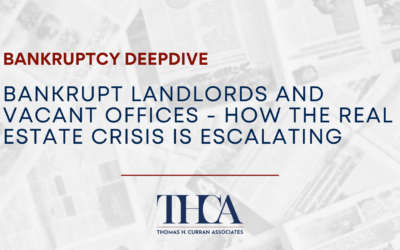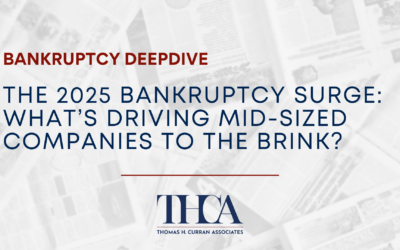What is Chapter 11 Bankruptcy?
Chapter 11 bankruptcy allows businesses that are still viable, but experiencing financial difficulties, to continue operating while negotiating a plan to restructure their debts and operations and return to profitability. Corporations and limited liability companies most often utilize chapter 11 bankruptcy, but some individuals are eligible to reorganize their affairs under Chapter 11.
What is the Difference Between Chapter 7 and Chapter 11 Bankruptcy?
Both businesses and individuals may file for Chapter 7 bankruptcy, which is known as liquidation bankruptcy because it usually utilizes money from the sale of the debtor’s assets to pay off creditors. Businesses that file for Chapter 7 bankruptcy must also cease their operations. Chapter 11 bankruptcy, on the other hand, allows a business’s current owners to continue operating the company while negotiating a restructuring plan with creditors. The goal for a Chapter 11 bankruptcy is for the business to exit bankruptcy debt-free and with an improved financial outlook. However, Chapter 11 bankruptcy is usually much more complicated than a Chapter 7 proceeding and can be far more expensive.
How do you File for Chapter 7 Bankruptcy?
A Chapter 11 bankruptcy case begins when the debtor files a petition with the Bankruptcy Court serving the area where the debtor is a resident. A debtor may file a voluntary petition, or an involuntary petition may be filed by creditors that have met specific requirements. The debtor is usually required to file the following with the court:
- Schedules showing assets and liabilities;
- A schedule of the debtor’s income and expenditures;
- A schedule of unexpired leases and executory contract; and
- A statement of financial affairs.
The court is required to charge a filing fee of $1,167 and a miscellaneous administrative fee of $550.
When the debtor is an individual, he or she must also file a certificate of credit counseling accompanied by a copy of any debt repayment plan developed during credit counseling. Other documents that must be filed include evidence of payment from an employer received 60 days before filing (if there is any), and a statement of monthly net income.
Will Filing for Chapter 11 Stop Creditors From Trying to Collect?
Filing for Chapter 11 bankruptcy results in the issuance of an automatic stay by the Bankruptcy Court. The automatic stay is an injunction suspending all creditor activity related to debt collection, foreclosure, property repossession, and legal judgments that arose before the petition was filed. The stay allows the debtor to negotiate with creditors without worrying about collection efforts. However, in specific circumstances, secured creditors can obtain a court order granting them relief from the automatic stay. Creditors who violate the stay and continue collection efforts may be liable for any damages caused suffered by the debtor.
What is a Chapter 11 Restructuring Plan?
A Chapter 11 restructuring or reorganization plan is approved by the Bankruptcy Court and usually allows the debtor to restructure its debts in a manner that repays creditors over a specified time period–usually five years. The plan may also require the debtor to sell some of its assets to repay creditors. The creditors have the opportunity to accept or reject the plan, but if a certain number of creditors accept the plan, the Bankruptcy Court will approve it over the objections of the other creditors.
What Happens at the Conclusion of a Chapter 11 Plan?
When the debtor has made all required payments under the restructuring plan, the Bankruptcy Court will discharge the debtor’s remaining debts. After discharge the debtor will be under no obligation to repay any pre-bankruptcy debt that was not provided for in the restructuring plan.
How are Small Businesses Treated in Chapter 11?
Traditionally, Chapter 11 bankruptcy has been too expensive and complicated for most small businesses to consider. However, recent changes to the Bankruptcy Code added Subchapter 5 to Chapter 11 to give businesses with less than $2.75 million in debt an option for bankruptcy that is faster, less expensive, and less burdensome than a traditional Chapter 11 bankruptcy. The federal Coronavirus Aid, Relief, and Economic Security (CARES) Act was enacted in March 2020 and raised the amount that may be discharged through a Subchapter 5 bankruptcy to $7.5 million for one year to help small businesses suffering economic damages as a result of the COVID-19 pandemic.
What is a Chapter 11 Disclosure Statement?
The debtor must file a disclosure statement along with the plan for reorganization. The disclosure statement filed with the Bankruptcy Court must contain the information necessary for creditors to make an informed decision about approving the debtor’s reorganization plan. Generally, the disclosure statement includes such things as business assets, liabilities, and a brief history of the company’s operations. In small business bankruptcy cases, the debtor does not need to file a disclosure statement.
What is a “Debtor in Possession” in a Chapter 11 Case?
The debtor in possession is the party, or parties, who own the business filing for Chapter 11 bankruptcy. During Chapter 11 proceedings, the debtor in possession acts as a fiduciary and controls the business assets and continues running the company. The U.S. Bankruptcy Code contains strict rules that must be followed by the debtor in possession, including accounting for property, examining or objecting to claims, and filing informational reports with the Bankruptcy Court.
Additional Questions About Chapter 11 Bankruptcy?
The experienced bankruptcy attorneys at Thomas H. Curran Associates are here to help. They have decades of experience with a wide variety of Chapter 11 proceedings and can help businesses determine whether filing for Chapter 11 bankruptcy is the right choice for their situation.
Bankruptcy Practice Results
Recent successful cases handled by the attorneys from Thomas H. Curran Associates. Find more here »
Supreme Court Denies Final Appeal, Finalizing Judgement Obtained by THCA
On June 24, 2024, the Supreme Court of the United States declined the petition to review filed by Sean Dunne and his ex-wife Gayle...
Thomas H. Curran Associates Secures Appellate Victory as Massachusetts Supreme Judicial Court Denies Appellant’s Attempt to Shortcut Ordinary Appellate Review
Thomas H. Curran Associates recently obtained an appellate victory in the Massachusetts Supreme Judicial Court on May 26, 2023, in the...
Thomas H. Curran Associates win is Affirmed in Florida, U.S. District Court – Client Wins Attorneys Fees
Law: Federal Rule of Civil Procedure 37(a)(5) Case: Premier Capital, LLC v. Larry Bryan (AP) Underlying Bankruptcy Case: In re Larry Bryan...
The Second Circuit Affirms Bankruptcy Fraud Judgment Obtained by Thomas H. Curran Associates, Recognizing the Continuous Concealment Doctrine
Law: Continuous concealment doctrine, 11 USC § 727(a)(2)(A), In re Olivier, 819 F.2d 550 (5th Cir. 1987); In re Boyer, 328 F. App’x 711,...
Thomas H. Curran Associates prevails on barring discharge due to fraud by debtor
Thomas H. Curran Associates recently secured a victory on behalf of an institutional asset manager, where the Bankruptcy Court for the...
Thomas H. Curran Associates prevails on post-trial motions and obtains full security for $23 million dollar financial fraud judgment on behalf of chapter 7 bankruptcy trustee
On February 8, 2022, the United States District Court for the District of Connecticut (Meyer, J.) enter its Order denying defendant Gayle...
Supreme Court Denies Final Appeal, Finalizing Judgement Obtained by THCA
On June 24, 2024, the Supreme Court of the United States declined the petition to review filed by Sean Dunne and his ex-wife Gayle...
Thomas H. Curran Associates Secures Appellate Victory as Massachusetts Supreme Judicial Court Denies Appellant’s Attempt to Shortcut Ordinary Appellate Review
Thomas H. Curran Associates recently obtained an appellate victory in the Massachusetts Supreme Judicial Court on May 26, 2023, in the...
Thomas H. Curran Associates win is Affirmed in Florida, U.S. District Court – Client Wins Attorneys Fees
Law: Federal Rule of Civil Procedure 37(a)(5) Case: Premier Capital, LLC v. Larry Bryan (AP) Underlying Bankruptcy Case: In re Larry Bryan...
The Second Circuit Affirms Bankruptcy Fraud Judgment Obtained by Thomas H. Curran Associates, Recognizing the Continuous Concealment Doctrine
Law: Continuous concealment doctrine, 11 USC § 727(a)(2)(A), In re Olivier, 819 F.2d 550 (5th Cir. 1987); In re Boyer, 328 F. App’x 711,...
Supreme Court Denies Final Appeal, Finalizing Judgement Obtained by THCA
On June 24, 2024, the Supreme Court of the United States declined the petition to review filed by Sean Dunne and his ex-wife Gayle...
Thomas H. Curran Associates Secures Appellate Victory as Massachusetts Supreme Judicial Court Denies Appellant’s Attempt to Shortcut Ordinary Appellate Review
Thomas H. Curran Associates recently obtained an appellate victory in the Massachusetts Supreme Judicial Court on May 26, 2023, in the...
Thomas H. Curran Associates win is Affirmed in Florida, U.S. District Court – Client Wins Attorneys Fees
Law: Federal Rule of Civil Procedure 37(a)(5) Case: Premier Capital, LLC v. Larry Bryan (AP) Underlying Bankruptcy Case: In re Larry Bryan...
Bankruptcy Areas of Expertise
- Bankruptcy Litigation
- Bankruptcy Trustee Representation
- Avoidance & Recovery Actions
- Chapter 11 Trustees & Examiners
- Discharge Litigation
- Bankruptcy Fraud Investigations
- Cross Border Foreign Litigation
- 363 Bankruptcy Sales
- Bankruptcy Preference Actions
- Involuntary Bankruptcy
- Chapter 11/13 Plan Objections
Bankruptcy News
With retail bankruptcies on the rise, who will survive the 2025 shakeout?
Bankruptcies reached an unprecedented level in 2024, and the trend appears to be continuing into this year. Some notable major retailers...
Bankrupt landlords and vacant offices – How the real estate crisis is escalating
Following the pandemic, a significant transformation in the corporate work structure was inevitable, especially for professionals...
The 2025 bankruptcy surge: What’s driving mid-sized companies to the brink?
A mere two months have passed since the beginning of 2025 and chapter 11 bankruptcy filings are already steadily trending upwards compared...
Evidence of Intent to ‘Hinder’ Wasn’t Sufficient to Deny Discharge, District Judge Says
In the recent case Wylie v. Miller, 22-10952 (S.D. Mich. March 29, 2024) [1] , a bankruptcy court’s decision to deny a couple’s discharge...
Creditor’s Don’t Receive Estate Assets Recovered After the Last Chapter 13 Plan Payment
In In re McCrorey, 18-00696 (Bankr. D. Idaho Jan. 26, 2024) [1] , Chief Bankruptcy Judge Noah G. Hillen of Boise, Idaho, held that if a...
Electric Scooter Company Bird files for Bankruptcy | CNBC
Bird, the popular electric scooter rental company filed for Chapter 11 bankruptcy protection in Florida Federal Court last month. Bird's...
With retail bankruptcies on the rise, who will survive the 2025 shakeout?
Bankruptcies reached an unprecedented level in 2024, and the trend appears to be continuing into this year. Some notable major retailers...
Bankrupt landlords and vacant offices – How the real estate crisis is escalating
Following the pandemic, a significant transformation in the corporate work structure was inevitable, especially for professionals...
The 2025 bankruptcy surge: What’s driving mid-sized companies to the brink?
A mere two months have passed since the beginning of 2025 and chapter 11 bankruptcy filings are already steadily trending upwards compared...
Evidence of Intent to ‘Hinder’ Wasn’t Sufficient to Deny Discharge, District Judge Says
In the recent case Wylie v. Miller, 22-10952 (S.D. Mich. March 29, 2024) [1] , a bankruptcy court’s decision to deny a couple’s discharge...
With retail bankruptcies on the rise, who will survive the 2025 shakeout?
Bankruptcies reached an unprecedented level in 2024, and the trend appears to be continuing into this year. Some notable major retailers...
Bankrupt landlords and vacant offices – How the real estate crisis is escalating
Following the pandemic, a significant transformation in the corporate work structure was inevitable, especially for professionals...
The 2025 bankruptcy surge: What’s driving mid-sized companies to the brink?
A mere two months have passed since the beginning of 2025 and chapter 11 bankruptcy filings are already steadily trending upwards compared...
Contact Us
Are You In Need of Legal Counsel for a Bankruptcy Matter, Business Transaction, or Commercial Litigation?
Contact our team today.
Call us at (617) 207-8670 or use the quick contact form below.
Austin Office
7710 N. FM 620
Building 13-D
Austin, TX 78726
Boston Office
15 Broad Street
Suite 610
Boston, MA 02109
New York Office
17 State Street
40th Floor
New York, NY 10004
London Office
The Leadenhall Building
Level 30
122 Leadenhall Street
London EC3V 4AB
Tags: what is chapter 11 bankruptcy how to file for bankruptcy chapter 11 filing personal bankruptcy chapter 11





